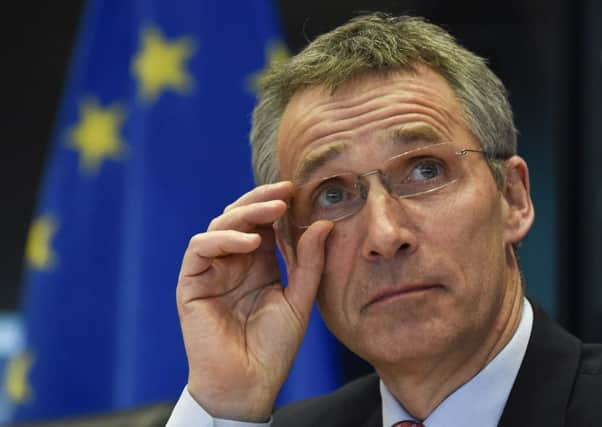Paris Gourtsoyannis: Trump poses challenge to Europe


There are six weeks left in 2016 – plenty of time to claim another well-loved musician like David Bowie, Prince or Leonard Cohen. But thankfully not enough time for another political upheaval on the scale of Brexit or last week’s US election result.
The respite will be brief. If 2016 has been a terrible year for great music and high blood pressure, just wait to see what the next 12 months have in store for global politics.
Advertisement
Hide AdAdvertisement
Hide AdIt is an ominous sign that the bitterest battle triggered by Mr Trump’s election isn’t between his jubilant supporters and the anguished protesters gathered outside Trump Tower, but among his opponents themselves.
Since the early hours of last Wednesday morning, the left in the United States has been consumed by attempts to explain how Hillary Clinton was denied the coronation her backers believed decades of public service demanded.
As the photo of a grinning Nigel Farage next to the president-elect attests, the answers they arrive at have implications for the cohesion of Europe and the future of the left across the west.
For those who believe the impact of a Trump presidency is limited outside the United States, Jens Stoltenberg’s warning to the new leader of the free world not to renege on Nato responsibilities demonstrates how high the stakes are on this side of the Atlantic.
Liberals in the United States are unable to mount a credible challenge as long as they remain paralysed by the basic question of whether Mr Trump’s victory was insurgency based on class or race.
Those who insist it was the latter point to streams of hatred from – usually anonymous – Trump supporters on social media and the stark racial divide in the vote. They argue that Mrs Clinton’s defeat was victory for anti-immigrant rhetoric and a backlash against eight years of an African American president, followed by the first female candidate with a chance at the White House. They tend to defend Mrs Clinton’s nomination, insisting she won among voters earning less than $50,000 per year.
The opposing camp believe economic factors were decisive, and tend to believe that the result might have been different if Bernie Sanders was the candidate. Mrs Clinton’s aloof manner and Wall Street connections made her a terrible choice for an election dominated by the concerns of a middle class whose incomes have stagnated. Close to seven million Democratic voters who backed Barack Obama at the polls failed to turn out for her.
Of course, the reality is that both can be true at the same time.
Advertisement
Hide AdAdvertisement
Hide AdThe anguish on the left may be understandable, but the surprise isn’t. Job flight from the midwest is hardly a new phenomenon, and the Democrats should have been prepared for its political consequences. It is, after all, written in big letters across the middle of the American political map. It was the “Rust Belt” that swung most decisively in favour of Mr Trump.
Eight years ago in the Ohio primary to decide the Democratic nominee for president, the two candidates’ spokespeople exchanged insults over who was serious about renegotiating the North American Free Trade Agreement and protecting manufacturing jobs. Those two candidates were Hillary Clinton and Barack Obama. Surely the greatest failure of Mr Obama’s presidency is not doing enough to tackle inequality while in power, to protect his legacy at this election.
If the left in America have few clear answers to the challenge that Donald Trump’s election poses, then the situation is no better across the Atlantic. In the UK, Jeremy Corbyn has sought to simultaneously appear as if he can harness the same anti-globalisation sentiment as Mr Trump, while also being his toughest critic.
The Labour leader shares “some similarities” with Mr Trump, according to Emily Thornberry, who praised the president-elect for “talking about the importance of investing in jobs and infrastructure and in the economies across the country, not just the main cities”.
Mr Corbyn himself called Mr Trump’s victory an “unmistakable rejection of a political establishment and an economic system that simply isn’t working for most people”, while condemning the worse excesses of his campaign.
Equivocation on the left about whether to face a wave of right-wing populism by being more or less like Trump could deliver the decisive blow to European co-operation in 2017. From January next year, for the first time in 70 years, the person sitting in the White House will have explicitly rejected the postwar consensus that the world is more secure when Europe and the United States guarantee each other’s security.
President-elect Trump and Mr Corbyn are in prefect agreement that central Europe should become an effectively de-militarised zone. Mr Stoltenberg is clear about the threat that poses to Nato, and the encouragement it offers to Vladimir Putin to take even bolder action beyond the encroachment in Ukraine and intervention in Syria.
Meanwhile, despite Mr Corbyn’s claim that he is building alliances with continental socialist parties that can protect European co-operation, the left is in retreat almost everywhere.
Advertisement
Hide AdAdvertisement
Hide AdAlready emboldened by Brexit, right-wing anti-EU forces across the continent are looking at Mr Trump’s victory and wondering if their own can make it a full set. Marine Le Pen lurks within striking distance of the lead in polling for the French presidential election. In her interview on the Andrew Marr Show on Sunday, she said she thought Mr Trump’s victory made her own more likely.
In the Netherlands, Geert Wilders’ Freedom Party could form the next government. In Italy, the left-wing coalition of prime minister Matteo Renzi risks losing a constitutional referendum, triggering a general election next year. The beneficiaries are likely to be the populist, anti-European Five Star movement, which shares Mr Trump’s sympathy for Russia.